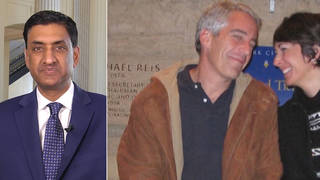
Topics
Guests
- Maxwell FrostDemocratic congressmember from Florida who was among a group of Democratic lawmakers who visited the Everglades detention facility known as “Alligator Alcatraz” on Saturday.
- Claire HealyEsserman investigative fellow for the Miami Herald.
Florida Democratic Congressmember Maxwell Frost joins us to discuss how he observed horrific conditions in Florida’s new immigration detention jail in the Everglades, known as “Alligator Alcatraz,” when he joined other lawmakers in a visit. “I saw myself in those cages. It was a lot of people my age that looked like me,” says Frost. “The administration is essentially trying to ethnically cleanse the country.” We also speak with a reporter at the Miami Herald, which reports hundreds of detainees at the Everglades immigration prison have no criminal records or charges, contradicting claims by the Trump administration. The newspaper recently published a list of people detained or believed to be detained at the facility, helping families locate their loved ones.
Transcript
AMY GOODMAN: This is Democracy Now!, democracynow.org. I’m Amy Goodman, with Juan González.
Democratic lawmakers are blasting the horrific conditions in Florida’s new immigration jail in the Everglades, which Republican politicians are calling “Alligator Alcatraz.” After visiting the jail Saturday, the Democratic lawmakers say it should be shut down.
The Miami Herald found hundreds of prisoners at the Everglades prison have no criminal records or charges, contradicting claims by the Trump administration that the people held there are “the worst of the worst.” Meanwhile, critics have called the facility by other names, including “concentration camp,” “internment camp,” “gator grift” — a reference to how the Texas-based company IRG Global Emergency Management gave $10,000 to Florida’s Republican Party just days before it received a no-bid, $1.1 million contract with Florida to, quote, “provide operational support services in support of migration efforts in the state,” unquote. Drop Site News and others report funds from FEMA’s Shelter and Services Program are being used to fund the so-called Alligator Alcatraz jail, estimated to cost at least $608 million.
Florida’s Republican Attorney General James Uthmeier, a longtime ally of Florida Governor Ron DeSantis, has been called the mastermind of the jail. The publisher of Florida Politics wrote, quote, “In Uthmeier, DeSantis found his own Stephen Miller,” the far-right immigration hard-liner and White House senior adviser. Attorney General Uthmeier was appointed to that position to replace Ashley Moody, who took the Senate seat of Marco Rubio when he became secretary of state. Meanwhile, Miller has urged politicians in Republican states to build their own versions of Alligator Alcatraz.
STEPHEN MILLER: We want every governor of a red state — and if you’re watching tonight, pick up the phone, call DHS, work with us to build facilities in your state, so that we can get the illegals out, we can get the criminals out.
AMY GOODMAN: This comes as Trump’s budget bill reportedly includes a provision that allocates three-and-a-half billion dollars to eligible states for immigration enforcement and detention.
For more, we’re joined by Florida Democratic Congressmember Maxwell Frost, among a group of dozens of Democratic lawmakers who went to the jail Saturday. We’re also joined by Claire Healy, Esserman investigative fellow for the Miami Herald, the latest stories headlined “Exclusive: Hundreds at Alligator Alcatraz have no criminal charges, Miami Herald learns” and “Is your family member or client at Alligator Alcatraz? We obtained a list.”
We welcome you both to Democracy Now! Congressmember Frost, let’s start with you. Talk about the trip you took on Saturday with dozens of Democratic lawmakers from Florida. What did you see?
REP. MAXWELL FROST: So, originally, we actually planned an unannounced trip. And, you know, I’ve done a couple of these ICE detention facility visits. Them being unannounced is very important, because you see things for how they are. Somehow, word got to the state that we were coming, and so they issued us an invitation at the same time and same date we were going to go anyway. We still decided to go, to see what’s going on in there.
And we saw abhorrent conditions, a lot of crowding, 32 male individuals per cage — these people are being caged — three toilets per area. And the drinking water, it comes from the toilet apparatus in the cell. Not only that, but there is not enough resources and not really an ability for them to be able to speak with their legal counsel or lawyers. There’s not a really clear way on how legal counsel can go to the facility to meet with them. That’s one of the questions I asked over and over again. I received a phone number in an email. I publicly gave out the email at a press conference right after. And now lawyers are calling me, saying, “Maxwell, the email is bouncing back. It’s not working.” And so, there’s a deliberate attempt here, it seems, to keep these immigrants and keep these people from their right of due process, of course, but also their right of even being able to speak with their counsel and their family.
We’ve heard of the toilets not working. Yes, there’s three in each cage, but sometimes two of them don’t work. We actually heard a story of one night when one of the toilets backed up and started spewing, essentially, feces around the cage, and it wasn’t until hours later 'til they were moved to another one. So, it's things like this.
Now, I will tell you we heard directly from one of the lawyers who spoke with someone the night before we got there. Magically, they got their first shower. Magically, they got a meal that was a lot better than it’s been before. That’s part of the reason why these visits from members of Congress and oversight are so important, because it keeps the people running this internment camp on their toes. And so, I’ll be back at a time of my own choosing, a date of my own choosing. I don’t need permission from Ron DeSantis to choose when I want to go, because it is a federal facility operated by the state. They made as much as that clear when I was inside of it this past Saturday.
JUAN GONZÁLEZ: And, Congressman, who are security personnel? Are they state officials, ICE officials, private security? What were you able to tell about that?
REP. MAXWELL FROST: Here’s the other thing. It’s essentially a private detention facility. Now, no one would — no one will call it that. But when I pulled up, the people who came up to me to check my ID, they’re from a private company, Delta Foxtrot Solutions Incorporated. Then I go inside. I actually asked this gentleman, because he had a badge. It looked like a police department badge. And I squinted, looked at it. It had the name of a company. I asked him, “Is that your company?” And he looked at me, and he said, “Well, Congressman, we’re a private company. I’m not — I’m not law enforcement. I’m not required to tell you anything about myself.”
So, I park, assuming, well, maybe they’re hiring third-party security to do the parking, or something like that. But I get into the facility, and that moment when they let us into the tent that has the cages where 32 men are squished in a cage and they’re sweating, it was all private security dealing with the actual detainees, as well. I barely saw law enforcement. I barely saw National Guard troops. And I saw a lot of private security and, actually, private doctors, who are also handling the medical side of things. So, it is, essentially, a privately run center, and people are getting rich off of the internment of immigrants in the Everglades right now.
JUAN GONZÁLEZ: And were you able to talk to detainees about their access to attorneys or their ability to communicate with the outside world?
REP. MAXWELL FROST: No. There was actually two instances when I was looking to speak with detainees. And again, I’ve done these trips before. Usually I am allowed to talk with, really, whoever I want to speak with, unless they say they don’t want to talk with me. They wouldn’t even give me the chance.
The first part, they said, “Oh, well, don’t talk to people in the medical unit, because of HIPAA.” Complete BS. I’ve spoken with people in medical units before in other detention facilities. HIPAA would mean, well, don’t go into their appointment and listen in, which is not what I asked to do.
But then, the second part is when they let us in to see the actual cages. And I have some people who asked me, “Well, Max, why didn’t you just go in and talk with them anyway?” Well, they had about six guards physically blocking us from entering the cages. We essentially could only look at it. But I got to tell you, standing at that door and hearing from hundreds of people, “Help me! Help me!” — one guy was yelling, “Call my family! Tell my wife I’m OK!” He started yelling a phone number. I couldn’t necessarily make it out because it was too loud.
I saw myself in those cages. It was a lot of people my age that look like me. And when I was walking out of the facility — and I don’t like to call it the name that they’ve given it. They’re doing it to make light of it and sell merch. I’m not going to be part of that. As I was walking out, though, it hit me that I’m one of — you know, I’m the first Afro-Cubano in Congress. I’m walking out of there, thinking to myself, “I’m going to be one of the only people that looks like me, that is Latino, that will walk into this facility and walk out on my own accord.”
And it goes to show exactly what this is meant to do. The administration is essentially trying to ethnically cleanse the country of Latinos, of Haitians. Because I’ll tell you, when I was in that facility, I didn’t see any, you know, Europeans who’ve overstayed their visa or anything like that. It was all Latinos, all Haitian people, and nothing else.
AMY GOODMAN: I want to bring Claire Healy into the conversation. Claire, you’ve been working, really an amazing team of people at the Miami Herald, where you’re doing investigations into this Everglades jail. Can you just summarize for us? I mean, we got it from the headlines, but who’s being held there? What are they charged with? How many men? We’re talking hundreds and hundreds?
CLAIRE HEALY: Right, we’re talking 750, as far as we know, at the moment. So, my colleagues and I, we obtained a list of 750 people. The ages range from 18 to 73. And these are people from about 40 countries around the world. Half are made up of people from Mexico, Guatemala and Cuba.
And so, they are categorized in three buckets — you know, people with criminal convictions, pending charges, and then immigration violations. And so, we have not yet been able to independently verify all of those people, but there are about 250-plus in that third category, meaning they have no criminal convictions or criminal charges in the United States. And so, also, within each of those categories, those charges, those convictions, what immigration violation means can really range. So, we’ve talked with family members who say — you know, of a 56-year-old Nicaraguan man, for example, that he came here legally under humanitarian parole in 2023, and he has been applying for asylum, so he has a pending asylum case. And he was detained after a traffic stop. So, he was a passenger in a vehicle that was pulled over by Florida Highway Patrol, and he is currently at the facility.
JUAN GONZÁLEZ: And, Claire, could you talk about — what is the 287 program under which this facility was built?
CLAIRE HEALY: So, this is a program that allows local law enforcement — and it’s really been utilized in Florida. I think Florida has the most local law enforcement agencies that have signed on to this program. It allows them to deputize officers for ICE and immigration enforcement. And so, what that means is that this is a state-run facility operating with the permission under this program in an immigration capacity. So this is an immigration detention center. But it is not — it is a state facility. It’s being run by the state, which is also something that has led to some difficulty.
For example, we have been noticing that this online government locator, an ICE locator that usually allows the public, family members, attorneys to search for their loved ones, their clients, using their name and nationality, that usually shows where somebody is located, and people are transferred off. And so, this is an important tool for family members. That is not showing anybody at this facility. And one of the possible reasons is that this is a state-run facility. You know, DHS has said that this is the state. And so, people are not showing up in that facility. And we’ve been hearing from family members, attorneys that they only learned their loved one or client was there when that person was able to give them a call from the facility. And sometimes they haven’t even known until we published this list. That’s one of the reasons we published the 750 names of people detained there or who appear to be scheduled to be detained there.
AMY GOODMAN: And finally, Congressmember Frost, you’re calling for this place to be closed?
REP. MAXWELL FROST: Yes, it needs to be closed immediately. The conditions I saw there are abhorrent. But I also got to be honest with everyone watching. A lot of people are, you know, now learning about detention facilities. I got to tell you, I went to Baker detention facility in North Florida. The conditions are also abhorrent there. At the time, I wrote to President Biden, saying that place needs to be closed, as well.
Oftentimes the thought process here is the conditions are so bad that as immigrants are trying to fight legally the deportation order, they get to a place where they say, “You know what? The conditions in here are so bad, I’d rather go — I’d rather leave the country. I’d rather sign my deportation papers,” and essentially demoralizing people. I met with two Haitian gentlemen when I was at the Baker facility in Starke, Florida, and both of them told me, “You know what? I’ve been fighting this deportation for eight months. I’d rather fight for my life on the streets of Haiti right now than be in this facility a day longer.”
AMY GOODMAN: Five detainees have died in Florida alone this year in these immigration jails, or, related, in hospitals? Is that —
REP. MAXWELL FROST: I’m sorry?
AMY GOODMAN: Have a number of people died in detention facilities, or, related, in hospitals?
REP. MAXWELL FROST: Yeah. So, I think we’re right now at a number of, like, 12 or 13 nationwide. And yes, about half of them are in the state of Florida. So, I mean, it just goes to show that the dehumanizing of immigrants here is obviously — is not — the cruelty isn’t just the point. It’s part of a strategy to get people to feel so demoralized that they see all this going on around them, that they choose to sign those papers and not fight it legally.
AMY GOODMAN: Congressmember Frost, we want to thank you for being with us. Congressmember Maxwell Frost of Florida just went to this Everglades jail this weekend. And Claire Healy, part of the team at the Miami Herald, has been investigating this jail.
Next up, “Purge Palantir,” the banner held by protesters across the country, from Seattle to Palo Alto to Denver to here in New York, taking on the technology company they say uses AI to supercharge surveillance, from ICE to the Israeli military. Back in 15 seconds.
[break]
AMY GOODMAN: “Exit Only” by Deerhoof in our Democracy Now! studio.













Media Options